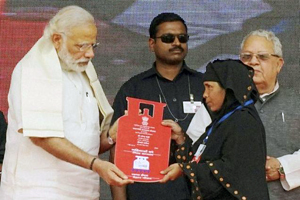Ballia, May 1: Prime Minister Narendra Modi launched a Rs 8,000 crore scheme to provide 5 crore free LPG connections to poor families as he attacked previous governments for just paying lip service to reducing poverty.
Calling himself 'Shramik No.1' (Worker No.1), he listed out initiatives taken by his government for the welfare of labourers.
The launch coincided with May Day and Modi attacked previous governments for doing little for the poor. "Policies made by previous governments were not keeping in mind the welfare of poor but only ballot boxes," he said.
Poverty, he said, can be eradicated only if poor are empowered, given resources and opportunities as well as education, jobs, houses, drinking water and electricity.
He questioned the policies pursued by the previous government for poverty eradication, saying poverty has only increased during past years.
"We are working to fight poverty," he said, adding that under the Pradhan Mantri Ujjwala Yojana, free LPG connections will be provided in name of women members of BPL households.
In the first year, 1.5 crore such connections will be released and the target of 5 crore will be completed in three years, he said, comparing it to the just 13 crore LPG connections provided in 60 years of independence.
"In my first speech in Central Hall of Parliament after BJP government came to power (in 2014), I had said my government is dedicated to poor.
"Whatever this government does will be for the benefit of the poor and for the welfare of poor," he said as he listed out various labour-friendly initiatives, including raising minimum pension to Rs 1,000 and introduction of labour identification number (LIN).
Also, the maximum wage that entitles bonus to workers has been raised to Rs 21,000 from Rs 10,000 per month previously, while the bonus limit too has been doubled to Rs 7,000.
Provident fund (PF) portability has been provided to help utilise the Rs 27,000 crore of retirement benefits lying unused because of workers changing jobs or cities.





Comments
Just like other \development\" programs , we will see the motive behind this very soon.. wait and watch!"
Add new comment